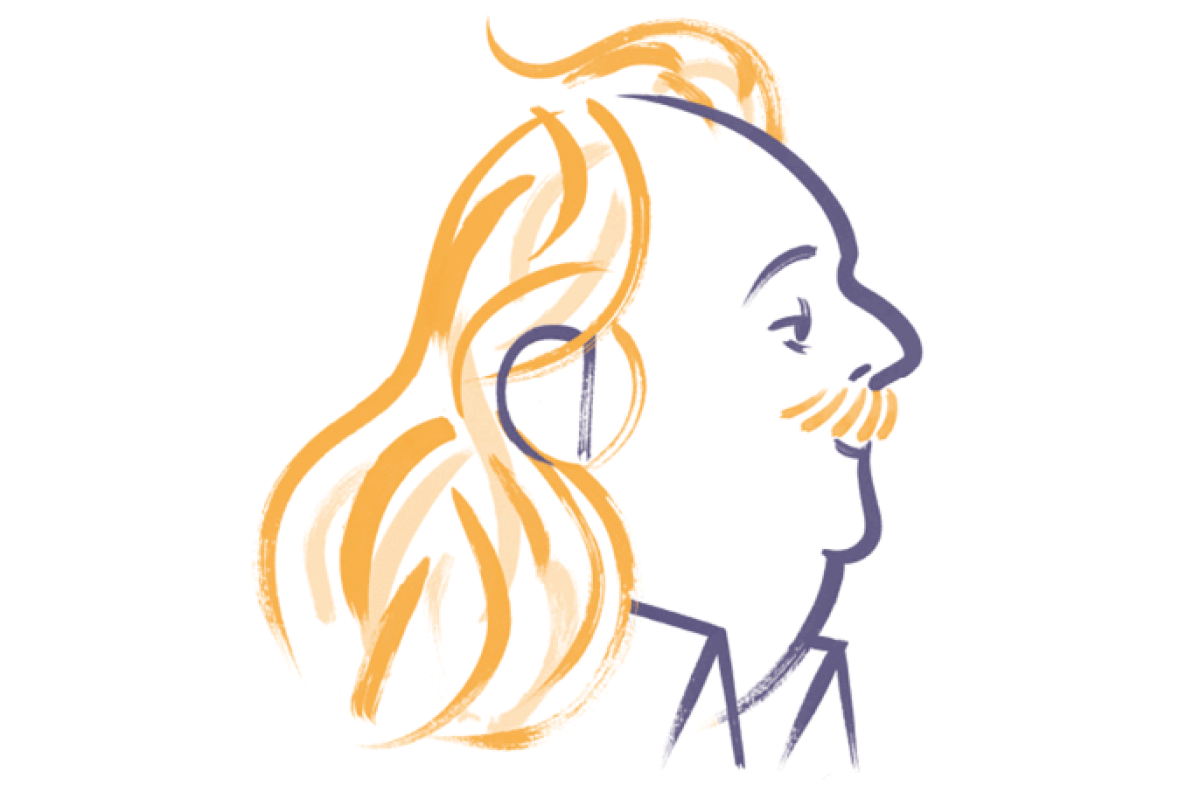A collection of Gold-isms: soft-porn videocassettes, Claes Oldenburg and Metallica

- Share via
It is possible that Jonathan Gold knew everything. The most obvious footprint of his expansive autodidacticism was the way he could drop references to anything with a fluency that you would connect with immediately if they were within your realm of knowledge or, if they weren’t, made you feel like you understood them. To salute that seemingly endless number of things he was hip to, here’s a wall of decontextualized Gold-isms. Let the words wash over you.
Jonathan Gold remembered in (mostly) his own words.
Have you ever wondered who buys those pale dresses at South Coast Plaza, the ones that somehow combine a bodycon contour with the dreamy floatiness of Stevie Nicks’ stage wardrobe circa 1983?
She turns the knife off, and you realize how ominous the sound had been; certain scenes from “The Texas Chain Saw Massacre” come to mind.
The location, a few blocks from Dodger Stadium, is ideal for both the Echo Park crowd and those of us seeking an escape when Joe Blanton blows another one in the seventh.
Another dining area is crowded with bush-size swirls of baby’s breath, like a tableau from the Rodarte Paris show in 2016.
The wallpaper looks like something William Morris might have dreamed up in his arsenic-green phase.
Still, while Mozart is divine, there also is a lot of pleasure in AC/DC.
Most of the hidden back of the restaurant is devoted to the massive loaves of bread he bakes every day — when you accidentally spot the jar holding the muffin-size seed of his levain, it feels as if you have run across a Horcrux, or maybe an Infinity Stone from the Marvel Universe.
I am occasionally reminded of the essay “Who Cares If You Listen” by the fabulously dissonant composer Milton Babbitt.
Even if you weren’t a paleo/Crossfit guy, you could still occasionally eat like one.
Where barbecue is Dionysian — one slab of ribs might dazzle with intense smokiness, another with jerkylike texture, a third with its peppery sauce — fried chicken is Apollonian, always measured against a classical ideal.
Comparisons to the magical cook in “Like Water for Chocolate” are not uncommon.
We’re as likely to become crushed out on a new restaurant as a 14-year-old is on the latest Zayn track.
It is presumably named for the French symbolist poet whose love affair with Rimbaud may have made you swoon sophomore year; the stuffed peacock mounted on a wall of the restaurant’s modernist patio points to that era.
I bit into the thing, and the snap of the dog rang out like the plucked G string of a cello, and my mouth filled with hot, garlicky juice.
A huge wall mural by the local collective Cyrcle that looks like one of Francesco Clemente’s Palio paintings channeled through Roy Lichtenstein.
A billboard-sized vintage nude in the barroom upstairs has the unsettling presence of a photo stolen from your great-grandmother’s Instagram feed.
When you hear your lawyer or your tax accountant lapse into dude on the phone, usually when she is talking to a high-school buddy who still delivers flowers for a living, it can be as if you had just discovered that she knows how to speak fluent Urdu.
It’s the one place on the Westside you’re pretty much guaranteed not to hear Paul Simon or David Byrne mangle the tropical greats.
I glanced at Michael Ovitz, whose face had the queer, moonish luminescence I usually associate with Japanese lanterns, and I noticed that people were approaching his table as reverently, as gingerly, as if it was a shrine.
It’s not dinner; it’s Gesamtkunstwerk.
I had barely found a seat before a customer came up to me, put her hand on my shoulder and said, “One word: chilaquiles,” as if she were the guy giving Dustin Hoffman advice in “The Graduate.”
The surface of the plate was as saturated with brick-red splatter as the background of a Chaz Bojórquez painting.
The restaurant is named for the Green Hornet sidekick played by Bruce Lee in the ‘60s TV series, although I was kind of hoping that it was named for the Los Angeles viola virtuoso Roland Kato.
The Yeezys will wait.
You may be expecting a stir-fry, but what is brought to the table looks like a tie rack you might find in a Hammacher Schlemmer catalog tucked into a first-class seat back, thick slices of cured pork belly draped across the dowel at the top like so many silk cravats.
I sometimes think of his menu here as the equivalent of a band like Metallica doing a covers set just because it can.
Tampopo is presumably named for “Tampopo,” the 1987 Japanese comedy that explored the subject of noodles the way that “Behind the Green Door” explored the subject of Marilyn Chambers.
I like this salad, but I suspect that, 40 years ago, it might have made someone like Charles Laughton stomp off in a huff.
In a velvet coffin of a dining room in back, you settle into chairs that are a cross between plush CEO-model office chairs and the pods from the old Monsanto ride at Disneyland.
Late at Swingers on a Wednesday afternoon, the front booths emptied of the lunchtime Cherokee drivers and the back room not yet occupied by the guys who show up for $2 happy-hour pitchers of Rolling Rock, the stereo pounds out Big Daddy Kane, the curbside teems with old Valiants, and half the males in the restaurant — goatees, tribal tattoos, groovy pirate earrings — kind of look like they play bass or something for Tool or Alice in Chains.
Lumpinee is most famous locally for its advertising leaflets, astonishing folk-art documents that rank right up there in sheer gonzo complexity with squeeze bottles of Dr. Bronner’s peppermint soap.
Its dumplings more closely resemble old-fashioned hot water bottles, or, really, like Claes Oldenburg‘s Pop art sculpture of a hot water bottle that used to grace the Los Angeles County Museum of Art’s courtyard.
A husky Gerard Depardieu of an onion soup.
A pink-pink Allee Willis painting glares with the harsh, white light you associate with the insides of antique Frigidaires, and her motorized collage on the far wall jiggles and whirs.
As a social institution, the Hard Rock Cafe probably ranks somewhere between MTV and junior high school; as a restaurant, between McDonald’s and Morton’s; as a cheap date, between El Coyote and a spot on the guest list at the Roxy.
Bahooka is the kind of place you’d expect to find near a scruffy tropical seaport, all rusted nautical gear, stolen street signs and scarred dark wood, lit like a Navy-base bar and with more bobbing tropical fish than you’d find in a Jacques Cousteau special.
On the sidewalk in front of El Parian, babies scream and vendors sell battery-powered puppies and charanga cassettes.
In the great march of world civilization, every country has done its part. The Germans contributed the symphony; the French, symbolist poetry; the Irish, William Butler Yeats. The Dutch chimed in with Mannerist painting, the Nigerians with the great sculptures of Benin. And the Belgians? French fries ... well, fries and a funny kind of beer that tastes like cherries. Monks make it, I think.
The wine list runs the length of a T. Coraghessan Boyle novel.
You can buy a jar of beans or a soft-porn videocassette from practically any country in the world.
Hamburgers, like music, may be grouped into two broad categories: classical and pop. The former, almost Mozartean in simplicity, is made up of bun, burger, bun, the ABA form so beloved by poets and troubadours, perhaps jazzed up by the addition of a condiment or two. In a pop burger, the meat is subsidiary to its context.
Sommeliers cross-cutting between elegant Burgundies and stank pét-nats with the fluency of an old-school hip-hop DJ.
The dark wood paneling gives the impression of a 1970s fern bar without the Tiffany lamps or the ferns.
I thought of it as kind of a Waze for noodles.
The cabbage is served with tart yogurt and sumac, but the overall effect still manages to be more Mitteleuropa than Middle East, its char and winelike complexity alluding to something like a Romani campfire dish best enjoyed in the bitter cold.
—Assembled by Peter Meehan, Lucas Kwan Peterson and Amy Scattergood
More to Read
Eat your way across L.A.
Get our weekly Tasting Notes newsletter for reviews, news and more.
You may occasionally receive promotional content from the Los Angeles Times.











